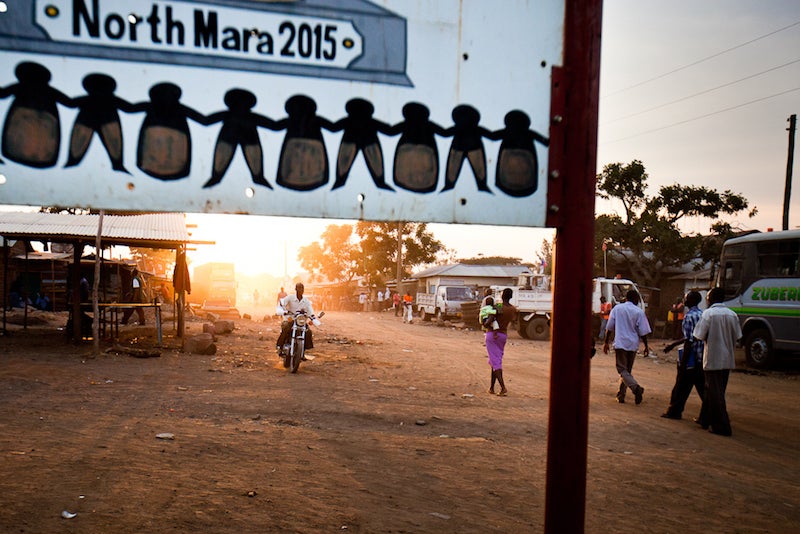(London, 14 August 2020) – Three more Tanzanian victims have joined a legal claim in British courts against Barrick Gold subsidiaries for serious human rights violations at the company’s North Mara gold mine in northern Tanzania. Barrick’s subsidiaries have now been served with the proceedings relating to the new claims with the final documents being served last Friday (7 August).
The initial claim was issued in the British High Court in February 2020 on behalf of seven human rights victims against Barrick Tz Limited, formerly known as Acacia Mining, of which Barrick was the majority shareholder, and its Tanzanian subsidiary.
The new claimants allege that security forces guarding Barrick’s gold mine shot and killed members of their families. The three claimants include a young man whose father was shot in the head at close range on the mine site, another young man whose brother was shot in the chest and a young woman whose husband was shot in the back as he was fleeing security forces at the mine. All three of the deceased were fathers to young children.
The claimants say that it was the Tanzanian police, who are paid and equipped by the mine under an agreement requiring the police to coordinate security operations with mine personnel, who fired the lethal shots.
“These claims underscore the seriousness of the human rights abuses and violent tactics used for years by security forces at Barrick’s North Mara mine,” said Anneke Van Woudenberg, the Executive Director of UK corporate watchdog, RAID. “Barrick should actively pursue means to remedy the violations and take immediate steps to ensure such abuses are not repeated.”
The North Mara gold mine, located in a remote part of northern Tanzania, has been plagued by reports of serious human rights abuses against local community members by security forces since it was acquired by Barrick in 2006.
This week Barrick released its half-year results and said that it faced a “clean-up of Herculean proportions” at its Tanzanian operations on environmental, human rights and tax issues following its buy-out of the minority shareholders in Acacia Mining in September 2019.
Barrick’s CEO, Mark Bristow, has previously acknowledged that “Acacia was an irresponsibly-run business” which was “not properly managed”. At Barrick’s results presentation on 10 August, Bristow said that the company had “broken relations” with the local community and that it was “still a work in progress”, although he has failed to account for the fact Barrick was the majority shareholder of Acacia Mining throughout this time.
On 9 July, RAID called on the London Bullion Market Association (LBMA) to suspend gold refiner MMTC-PAMP, which refines the gold from the North Mara mine, for its failure to act under responsible sourcing standards regarding the human rights abuses in its supply chain. The LBMA has yet to issue MMTC-PAMP with its responsible gold certificate for 2019. Failure to meet the standards would result in MMTC-PAMP being removed from the LBMA’s Good Delivery List.
Scores of companies list MMTC-PAMP in their gold supply chains, including tech companies such as Apple, Nokia, Canon, Amazon, Cisco Systems and Lenovo, as well as vehicle manufacturers Tesla and General Motors, gambling company International Game Technology, and entertainment companies Walt Disney and Sony.
The group of victims have been assisted by RAID and MiningWatch Canada, which have both documented human rights abuses at the North Mara mine through repeated research visits beginning in 2014. The claimants are represented by British law firm Hugh James.
Further background:
This is not the first British lawsuit against Barrick’s subsidiaries for deaths and injuries at the North Mara mine. A previous lawsuit, commenced in 2013, was settled in 2015 by Acacia Mining. The mine’s engagement of the local police, which it pays, equips and accommodates to provide security in and around the mine site is central to the problem. The mine continues to employ the police despite a pattern of excessive use of force over many years against local residents on and off the mine site.
MiningWatch Canada and RAID documented 22 killings and 69 injuries at or near the mine from 2014 to 2016 alone. A 2016 Tanzanian parliamentary inquiry received reports of 65 killed and 270 injured by police jointly responsible for mine security. From 2014 to 2017, Acacia itself acknowledged 6 deaths relating to the use of force against intruders and/or police involvement and 28 other ‘intruder fatalities’, which it attributed to ‘fall from height’, ‘infighting’, ‘drowning’, ‘rockfall’, ‘vehicle accident’, and ‘other’. RAID has sought further information on these deaths, but none has been provided. Despite widespread attention and calls for reform at the mine, the abuses have continued. To MiningWatch and RAID’s knowledge, not a single police officer has been held to account.
For additional information, see:
- Press release on initial claims
- A RAID letter to Acacia Mining’s Board of director in June 2019
- A detailed RAID report on Acacia Mining’s flawed grievance mechanism
- A RAID editorial about key problems for Mark Bristow’s as he takes the reigns of Barrick Gold
- “Silent No More” a video by MiningWatch on sexual assaults of community women by mine security
- “Inequality of Arms” a MiningWatch Canada report on victims’ experiences with the mine’s inequitable grievance mechanism
- MiningWatch Canada’s review of the flawed operating procedures of the mine’s grievance mechanism
- A MiningWatch Canada report on human rights abuses at the North Mara Mine

